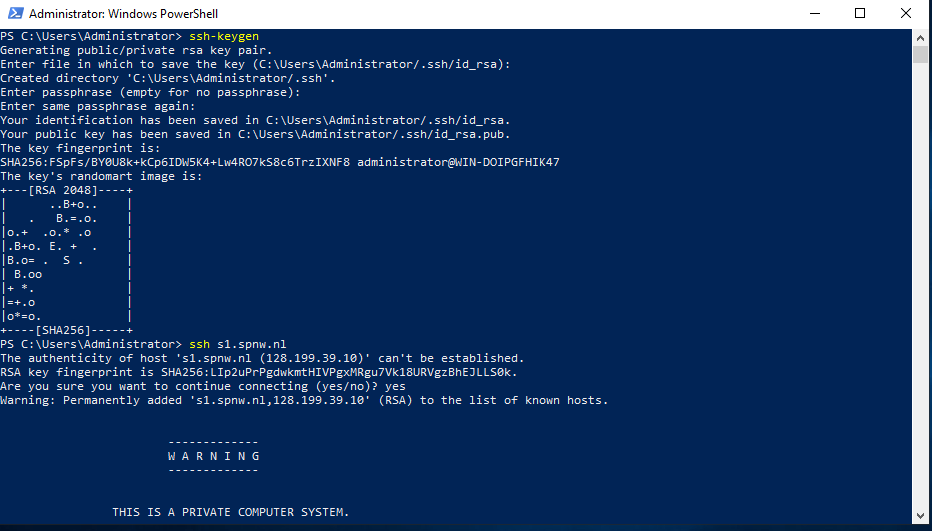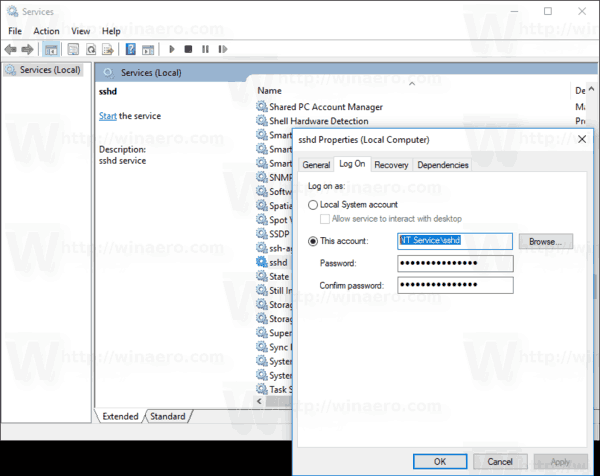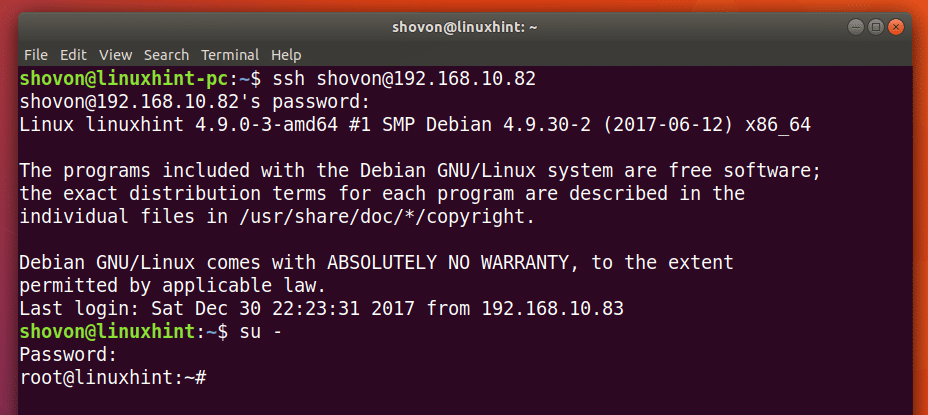Fix OpenSSH Server connection drops out after few minutes of inactivity. First, log into the remote server and then open your /etc/ssh/sshdconfig file: # vi /etc/ssh/sshdconfig Modify setting as follows: ClientAliveInterval 30 ClientAliveCountMax 5 Where.
- Sshd (OpenSSH Daemon) is the daemon program for ssh(1). Together these programs replace rlogin(1) and rsh(1), and provide secure encrypted communications between two untrusted hosts over an insecure network.
- 2 days ago I'd like to know where is the default OpenSSH config file ('sshdconfig' for Linux) or if not exists how to generate the file. I thought SSH setting file 'sshdconfig' and 'config' is the same format and same files, but apparently they are not.
Securing SSH Server. You can secure your OpenSSH server by setting the following options in the sshdconfig configuration file. X11Forwarding – Enabling X forwarding makes your system vulnerable to X11 related issues. Web manual pages are available from OpenBSD for the following commands. These manual pages reflect the latest development release of OpenSSH. Ssh(1) — The basic rlogin/rsh-like client program sshd(8) — The daemon that permits you to log in sshconfig(5) — The client configuration file sshdconfig(5) — The daemon configuration file ssh-agent(1) — An authentication agent that can store.
Note that the deactivation of 'ssh-rsa' signatures does notnecessarily require cessation of use for RSA keys. In the SSH protocol,keys may be capable of signing using multiple algorithms. In particular,'ssh-rsa' keys are capable of signing using 'rsa-sha2-256' (RSA/SHA256),'rsa-sha2-512' (RSA/SHA512) and 'ssh-rsa' (RSA/SHA1). Only the last ofthese is being turned off by default.'| From: | Damien Miller <djm-AT-cvs.openbsd.org> |
| To: | lwn-AT-lwn.net |
| Subject: | Announce: OpenSSH 8.6 released |
| Date: | Sun, 18 Apr 2021 18:53:14 -0600 |
| Message-ID: | <94b0350a0f8a1fac@cvs.openbsd.org> |
OpenSSH 8.6 released
Posted Apr 20, 2021 7:14 UTC (Tue) by wtarreau (subscriber, #51152) [Link]
The incessant switch between algorithms is a real pain. Initially we were all using RSA. Then we were told RSA was bad and that DSA had to be used instead. We all switched to DSA. Then DSA was deamed bad forcing many of us to turn back to RSA after facing connection issues on their machines, but with larger keys this time. Then ED25519 started to appear but is still not enabled on a wide number of already installed machines (typically the machines we have in our respective basements). Now RSA's dead again...SSH is widely used to connect, but not only where extreme security is required, simply where you need to connect (i.e. the old server on your local network, where it replaced telnet+ftp). In such situations removing support for algorithms breaks the connectivity, makes backups fail, and causes lots of grief. I think that clients should not completely remove support for no-so-old algorithm but instead require an extra option like '--insecure' or something like this. Because clearly if I can't connect anymore to some of my old machines, I'll go back to telnet, which never broke accessibility in 40 years. And I do think that SSH is better than telnet, even with older keys that a neighbor could fake for $50k to intercept my connection on my local network just to send me a 'you're pwned' banner when I connect...
OpenSSH 8.6 released
Posted Apr 20, 2021 7:39 UTC (Tue) by cjwatson (subscriber, #7322) [Link]
OpenSSH 8.6 released
Posted Apr 20, 2021 8:21 UTC (Tue) by Sesse (subscriber, #53779) [Link]
RSA keys yes, but that isn't the problem: SSHing to your switch, where you cannot change the sshd implementation, is. (Keys can, after all, be replaced pretty easily!) This is a huge pain, and has only been accelerating in the last decade.Unable to negotiate with <ip> port 22: no matching key exchange method found. Their offer: diffie-hellman-group-exchange-sha1,diffie-hellman-group14-sha1
I sometimes keep a machine on oldstable or oldoldstable around, so that I can have an older ssh(1) binary to SSH to stuff with…
OpenSSH 8.6 released
Posted Apr 20, 2021 9:20 UTC (Tue) by dottedmag (subscriber, #18590) [Link]
OpenSSH 8.6 released
Posted Apr 20, 2021 9:32 UTC (Tue) by Sesse (subscriber, #53779) [Link]
OpenSSH 8.6 released
Posted Apr 20, 2021 10:38 UTC (Tue) by Cyberax (✭ supporter ✭, #52523) [Link]
OpenSSH 8.6 released
Posted Apr 20, 2021 8:41 UTC (Tue) by Vipketsh (guest, #134480) [Link]
Openssh Server Config
A better example is some old(er) networking equipment, like a managed switch. These things are often disowned by their manufacturers so no hope to getting any update with more recent authentication schemes but the equipment works perfectly well for its intended function. I would be happy if they disabled rsa-ssh on the server and put it into some last-resort-fallback list on the client when negotiating the scheme.It would be great if security people today would understand that security is a function of *three* things: Confidentiality, Integrity and *Availability*. Clearly availability is being reduced here for no gain in Integrity.
OpenSSH 8.6 released
Posted Apr 20, 2021 10:14 UTC (Tue) by hkario (subscriber, #94864) [Link]
> Clearly availability is being reduced here for no gain in Integrity.
That's your opinion, not shared by wider security community.
Look for SSH Downgrade Attacks to learn why.
OpenSSH 8.6 released
Posted Apr 20, 2021 10:43 UTC (Tue) by pizza (subscriber, #46) [Link]
> That's your opinion, not shared by wider security community.> Look for SSH Downgrade Attacks to learn why.
Sure, and the net result of this 'improved security' is 'SSH downgrade to telnet'
Mission accomplished, I guess.
OpenSSH 8.6 released
Posted Apr 20, 2021 11:04 UTC (Tue) by hkario (subscriber, #94864) [Link]
First, count number of people that use SSH daily with modern ciphers and count how many people need to use long insecure protocols like SSHv1.Second, you aren't secure with SSHv1, at least with telnet you're not lying to yourself that you are. So there's a chance that you'll do something about it. That is improved security: real, not apparent.
OpenSSH 8.6 released
Posted Apr 20, 2021 11:32 UTC (Tue) by pizza (subscriber, #46) [Link]
> That is improved security: real, not apparent.What is 'real, improved' over dropping the barrier of attack from $50K to $0?
At $50K, you're only going to be vulnerable to larger criminal enterprises and nation-states that are specifically going after _you_. But at $0 you're open to every script kiddie on the internet with a copy of nmap.
Your argument is equivalent to getting rid of the front doors on houses because they're easy to open.
OpenSSH 8.6 released
Posted Apr 20, 2021 11:40 UTC (Tue) by hkario (subscriber, #94864) [Link]
OpenSSH 8.6 released
Posted Apr 22, 2021 17:39 UTC (Thu) by jschrod (subscriber, #1646) [Link]
No, you don't understand him.
It seems that there are a lot of ssh use cases that you haven't experienced yet, especially in the network devices realm.
OpenSSH 8.6 released
Posted Apr 20, 2021 15:03 UTC (Tue) by foom (subscriber, #14868) [Link]
If you have a device that's so old it only runs sshv1 -- which presumably means it hasn't been updated in 20 years -- does it really matter what protocol you use to connect to it?It's there any chance it isn't exploitable via some well known security vulnerabilities? Quite possibly even ones which have been nicely packaged into a one-click exploit toolkit, and a may be just as easy to 'login' with as an ssh client...
OpenSSH 8.6 released
Posted Apr 20, 2021 14:03 UTC (Tue) by epa (subscriber, #39769) [Link]
OpenSSH 8.6 released
Posted Apr 20, 2021 16:53 UTC (Tue) by Vipketsh (guest, #134480) [Link]
OpenSSH 8.6 released
Posted Apr 20, 2021 12:21 UTC (Tue) by pabs (subscriber, #43278) [Link]

OpenSSH 8.6 released
Posted Apr 20, 2021 16:55 UTC (Tue) by floppus (subscriber, #137245) [Link]
For $WORK we needed an inexpensive router with high IPSec throughput, and the option we settled on was a Mikrotik box, which runs some form of Linux but the crypto offload hardware is proprietary.Even when it comes to standard distros, though, dropbear added support for Ed25519 and RSA+SHA-2 only very recently, so those aren't yet supported in stable OpenWRT.
OpenSSH 8.6 released
Posted Apr 22, 2021 20:30 UTC (Thu) by Sesse (subscriber, #53779) [Link]

OpenSSH 8.6 released
Posted Apr 22, 2021 20:32 UTC (Thu) by pabs (subscriber, #43278) [Link]
OpenSSH 8.6 released
Posted Apr 22, 2021 20:36 UTC (Thu) by Sesse (subscriber, #53779) [Link]
OpenSSH 8.6 released
Posted Apr 22, 2021 21:00 UTC (Thu) by pabs (subscriber, #43278) [Link]
There are folks trying to change this, here are a few of the Debian derivatives I know about, I think they mostly do enterprise stuff though:https://wiki.debian.org/Derivatives/Census/VyOS
https://wiki.debian.org/Derivatives/Census/DANOS
https://wiki.debian.org/Derivatives/Census/CumulusLinux
https://wiki.debian.org/Derivatives/Census/OpenNetworkLinux
OpenSSH 8.6 released
Posted Apr 20, 2021 13:32 UTC (Tue) by itvirta (guest, #49997) [Link]
Removing things from the enabled-by-default list doesn't prevent enabling them when needing to talk to ancientequipment. It wasn't too long ago I used something like 'ssh -c3des' (or even 'ssh -1') to connect to some such
relic. Per-host settings for Ciphers, Protocol, KexAlgorithms and such in '.ssh/config' also help if you need to do
that often.
The problem is downgrades that can happen automatically, within the the default-enabled settings.
(And downgrading to telnet probably doesn't fit there.)
OpenSSH 8.6 released
Posted Apr 20, 2021 18:54 UTC (Tue) by lamikr (subscriber, #2289) [Link]
If I create the ca.key and pem file with OpenSSL 1.1.1k which I believe is the latest release by using typical command shown in many examples: openssl req -new -x509 -keyout ca.key -out ca.pem -days 45 -config ./ca.cnf
and then check the cipher used with command:
openssl asn1parse -in ca.key
From the output I can see that the des is still used as a cipher:
64:d=4 hl=2 l= 8 prim: OBJECT :des-ede3-cbc
Shouldn't openssl use something more secure by default?
OpenSSH 8.6 released
Posted Apr 20, 2021 19:41 UTC (Tue) by tamiko (subscriber, #115350) [Link]
> Shouldn't openssl use something more secure by default?It should. But this is entirely orthogonal to openssh changing it's default-enabled cipher set.
OpenSSH 8.6 released
Posted Apr 22, 2021 17:42 UTC (Thu) by jschrod (subscriber, #1646) [Link]
OpenSSH 8.6 released
Posted Apr 22, 2021 10:30 UTC (Thu) by jezuch (subscriber, #52988) [Link]
Ssh Server Config Ubuntu
Doing something once every couple of years does not strike me as 'incessant', and moaning about this particular one strikes me as denying reality. The reality of security is that the attacks only get better and time is *not* your friend. Thus key rotation should be routine, not an inconvenient thing you're forced to by external events.What is sad is that the designers of the SSH protocol were also denying this reality. Support for *automatic* key rotation and upgrade should have been designed into the protocol from the start. It is not, so everyone has to do it manually (or automating it themselves) and everyone suffers and security suffers even more. So, in the end, I don't really blame you for moaning.

Obviously I have a couple of decades of hindsight to benefit from so I guess it turns me into a smart-ass at this point :)
OpenSSH 8.6 released
Posted Apr 22, 2021 11:42 UTC (Thu) by pizza (subscriber, #46) [Link]
> Support for *automatic* key rotation and upgrade should have been designed into the protocol from the start.Absolutely!
I'm in a situation where I have a gerrit instance using one of these these problematic host keys (generated back in 2011), mostly hit by tools (ie git) on systems I don't control. I can't replace that problematic key with a stronger one without requiring manual intervention on every single client that hits this thing. Bleh.
OpenSSH 8.6 released
Posted Apr 22, 2021 13:59 UTC (Thu) by grawity (subscriber, #80596) [Link]
I think that clients should not completely remove support for no-so-old algorithm but instead require an extra option like '--insecure' or something like this.
Ssh Server Config Public Key Authentication
I somewhat agree with this, but, fortunately, OpenSSH isn't the only SSH client for Linux. PuTTY (specifically the 'plink' command) is actively maintained and has support for everything under the sun, from Ed448 to SUPDUP.
